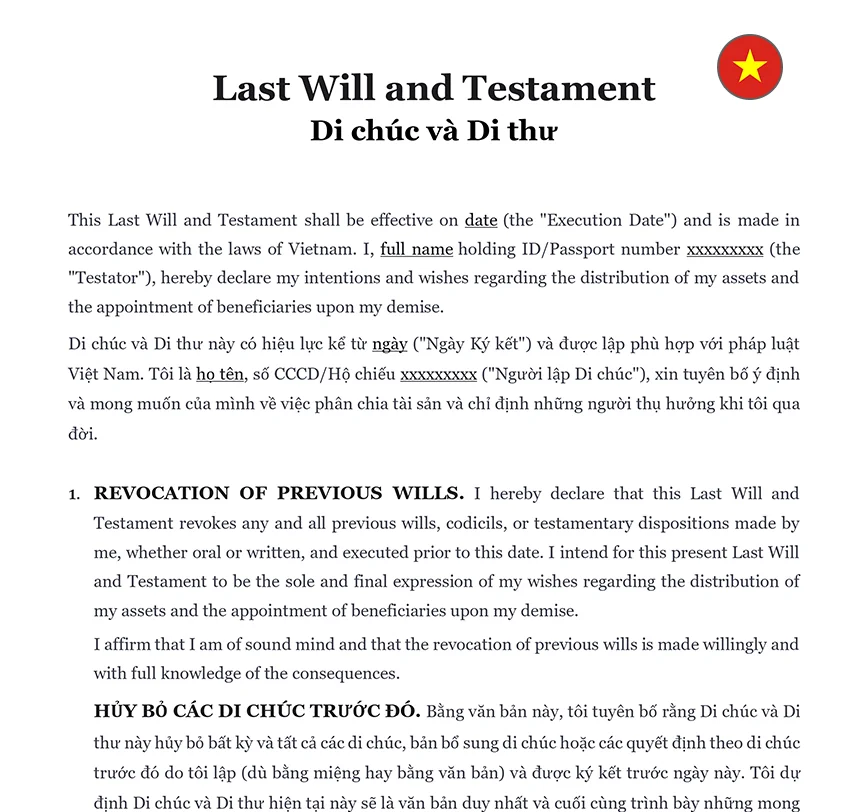Ready to use legal template
Drafted by experienced lawyers
Vietnamese-English translation
Ready to use legal template
Drafted by lawyers
Vietnamese-English translation
Home › Family law › Testament
Learn more about Testament in Vietnam
A Testament, also known as a Last Will and Testament, is a legal document that outlines a person’s wishes regarding the distribution of their assets and the care of any minor children after their death. In Vietnam, having a Testament ensures that your estate is distributed according to your intentions, reduces the risk of disputes among heirs, and provides peace of mind to your loved ones. Vietnamese inheritance laws allow individuals to leave property to their chosen beneficiaries, but the process must comply with formal requirements, including notarization or authentication. Whether you are a Vietnamese citizen or a foreigner with assets in Vietnam, having a clear Testament is essential for effective estate planning. At Themis Partner, we provide an expert-drafted Testament template, easy to edit in Word format, available in English and Vietnamese.
Table of contents
What is a testament?
What is included in a Testament?
Why is it important to have a Testament?
Are there specific requirements for Testaments in Vietnam?
Can a Testament be challenged or contested?
How do I appoint an executor for my Testament?
How can a testament be amended or revoked??
What if I don’t have a Testament?
What is a Testament?
A Testament, often referred to as a Will, is a crucial legal document that allows individuals to express their wishes regarding the distribution of their assets and the guardianship of their dependents after their passing. In essence, it serves as a blueprint for how a person’s estate should be managed and distributed once they are no longer alive. Through a Testament, individuals can designate specific beneficiaries to inherit their property, allocate assets to charitable organizations, appoint guardians for minor children, and name an executor to oversee the administration of their estate.
By creating a Testament, individuals gain peace of mind knowing that their affairs will be handled according to their desires after their death. It provides a clear and legally binding framework for the transfer of assets, helping to prevent disputes among family members and ensuring that loved ones are provided for in the manner intended by the deceased. Additionally, a well-drafted Testament can minimize the potential for confusion and legal complications, streamlining the probate process and facilitating the efficient distribution of assets to beneficiaries.
What is included in a Testament?
A Testament typically includes several key components:
Identification: The Testament usually begins with the full legal name and address of the testator (the person making the Will).
Executor Appointment: The testator appoints an executor, who is responsible for carrying out the instructions outlined in the Testament, including the distribution of assets and settling debts.
Beneficiary Designations: The Testament specifies who will inherit the testator’s property, assets, and belongings. Beneficiaries can include family members, friends, charities, or other entities.
Guardianship Provisions: If the testator has minor children or dependents, the Testament may designate guardians to care for them in the event of the testator’s death.
Asset Distribution: The Testament outlines how the testator’s assets, including real estate, investments, and personal belongings, should be distributed among the beneficiaries.
Specific Bequests: The testator may choose to make specific gifts or bequests of particular items or sums of money to individuals or organizations.
Debts and Expenses: The Testament may address how the testator’s debts, taxes, and funeral expenses should be paid, and from which assets.
Residuary Clause: This clause addresses any remaining assets after specific bequests and expenses have been accounted for, stating how they should be distributed.
Witness Signatures: For the Testament to be valid, it usually requires the signatures of witnesses who attest to the testator’s mental capacity and the voluntariness of their decisions.
Notarization (optional): Some jurisdictions require the Testament to be notarized for additional legal validity.
These elements collectively ensure that the testator’s wishes are clearly stated and legally enforceable upon their passing.
Why is it important to have a Testament?
Having a Testament is important for several reasons:
| ➤ Ensures Your Wishes Are Honored: A Testament allows you to clearly outline how you want your assets and belongings to be distributed after your passing. Without a Testament, your estate may be distributed according to default legal rules, which may not align with your wishes. |
| ➤ Provides for Loved Ones: A Testament enables you to provide for your family, friends, and dependents by specifying who should receive your assets. This can include financial assets, real estate, personal belongings, and sentimental items. |
| ➤ Appoints Guardianship: If you have minor children or dependents, a Testament allows you to designate guardians who will care for them in the event of your death. This ensures that your children are placed in the care of individuals you trust. |
| ➤ Minimizes Family Disputes:A well-drafted Testament can help minimize conflicts and disputes among family members by providing clear instructions for the distribution of your estate. This can help prevent misunderstandings and legal battles among heirs. |
| ➤ Facilitates Probate Process: A Testament can streamline the probate process, making it easier and more efficient for your estate to be settled. It provides guidance to the executor and reduces the likelihood of delays and complications in administering your estate. |
| ➤ Protects Unmarried Partners: For unmarried couples, especially in jurisdictions where there are no default inheritance rights for partners, a Testament is essential for ensuring that your partner receives a share of your estate. |
| ➤ Supports Charitable Causes: If you have charitable intentions, a Testament allows you to leave a legacy by specifying donations to charitable organizations or causes that are meaningful to you. |




